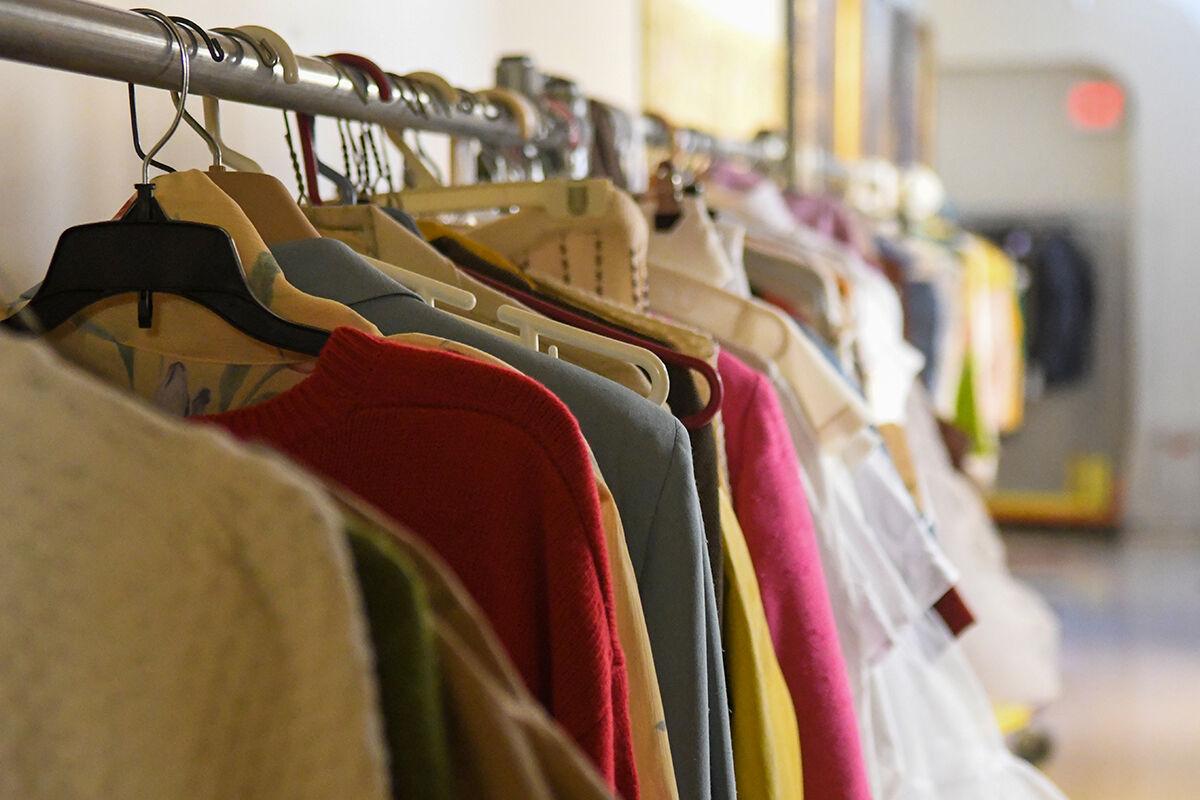
Emily Peedin
Miscellaneous costumes sit on a rack on Friday, Nov. 4, 2022 inside Frank Thompson Hall. Many of the costumes used in University Theatre productions are made or altered by students.
Amidst the thrum of serger machines and the crinkling of paper patterns, the costume shop at University Theatre is hard at work. Clothing racks line the corridors of Thompson Hall as students, managers and directors unite in their efforts to assemble a fabulous fabric ensemble.
As the showings for the spring musical, “Urinetown,” draw near, the final tweaks and alterations are wrapping up for dozens of detailed costumes. Such a monumental task takes a village with an eye for design and the know-how to craft visions into a reality.
Despite having over 20 cast members to clothe — often with multiple costumes — the heads of the costume shop have everything running seamlessly, pun intended.
Laura Parker, costume designer and shop manager at University Theatre, offered insight on how the costume shop has prepared for the upcoming performances.
“Our first step is to read the script … and to start taking notes on what sort of costumes there will be, making notes on how many total costumes and quick-changes there are,” Parker said. “It’s really fun to try and figure out how to facilitate those changes and make the process as easy as possible for the actors.”
Properly costuming a show is like constructing a puzzle. When compiled together onstage, actors’ outfits help portray a grand picture of the overall story. To effectively communicate the themes and other important aspects of the play, collaboration and communication is essential.
“In the early design meetings, it really is a lot of brainstorming about, ‘What is this world we want to create?’” Parker said. “[Director Danica Jackson] gives us large-scale ideas, and the design team will whittle that down into what we want the physical world to look like.”
In the case of “Urinetown,” the costumes lend insight to the world of the show through tactics like color blocking, which classifies characters based on the similar clothing they wear. Whether it’s dull gray industrial outfits or expensive vibrant clothes with rich textures, audiences will understand who belongs to which social group based on their costume.
Mia Self, assistant director of acting for this production, provides a comprehensive take on the important relationship between actors and their costumes.
“From an audience perspective, we read things like class, relationship and group membership with costumes,” Self said. “They are a quick visual marker for affiliation.”
Much like actors using their costumes to guide their acting process, audiences use similar logic to identify clues that piece together the characters on stage. However, the act of donning a costume is not just limited to theater productions.
“We are always communicating identity through clothing,” Self said. “We understand that a person wearing a three-piece suit is going to behave differently than someone in a tracksuit and sneakers. … For actors, costumes inform who [the characters] are, how they exist in the world and what kind of statement they are making.”
In order to make these statements of character possible, there must be a team of workers who have the knowledge of creating costumes from scratch. While the costume shop has many pieces of clothing compiled from other shows across the years, they are often responsible for sewing their own when the need arises for a specific piece.
Adrienne McKenzie, the costume shop technician, elaborated on the effort of crafting costumes.
“We constantly have something we’re doing,” McKenzie said. “At the beginning of winter break, that’s when we try to tackle the big ensemble numbers and get mass production done. I work from Laura’s direction … and we work to distribute that work amongst the students. Not only do they come in and get to learn things, but the student power is really important to what we do.”
Students are able to volunteer with several departments at University Theatre, and their help is always accepted and appreciated — no experience required. If students opt for the costume shop, they can expect to learn real-life skills like following patterns, taking accurate measurements and general sewing skills under McKenzie and Parker’s guidance.
Performances of “Urinetown” run Feb. 23-26. Check out University Theatre’s website for ticket sales and ways to get involved with the costume shop.